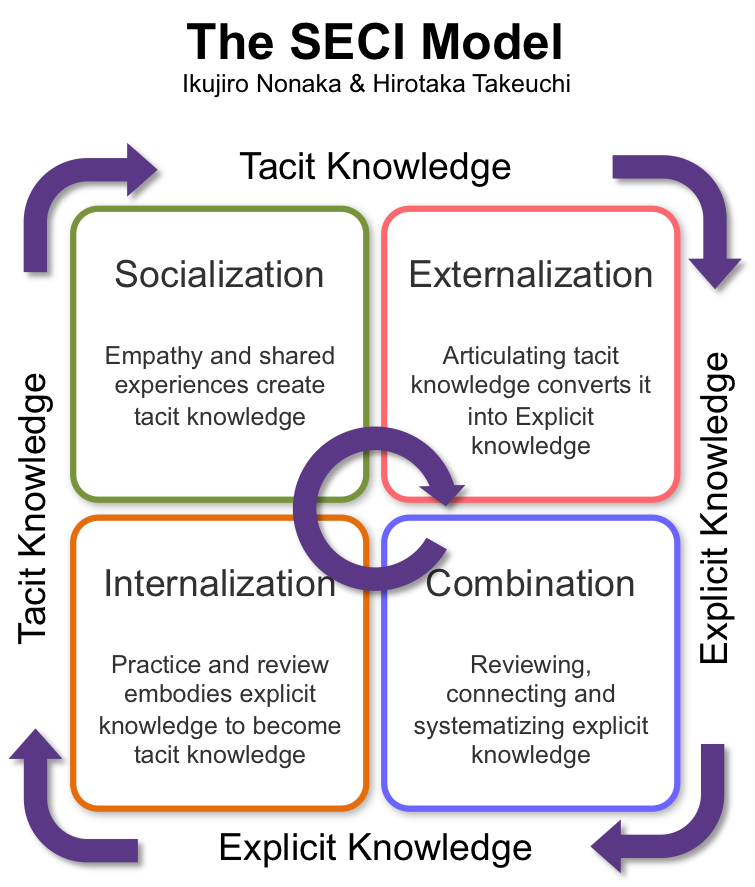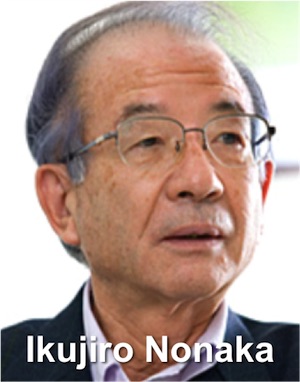Ikujiro Nonaka has been described by a long-term colleague and collaborator as the ‘Father of Knowledge Management’. He takes a radical view – in the true sense of radical: he goes to the route of how we acquire, create and share knowledge.
Very Short Biography
Ikujiro Nonaka was born in 1935 and grew up in Tokyo. He studied political science at Waseda University, gaining his BS in 1958. He started work that year at Fuji Electric, where his principal accomplishment was to create their management programme. He went on to further develop this, in alliance with Keio University.
Nonaka left Fuji in 1967, to study in the United States, at the University of California, Berkeley. He was awarded his MBA in 1968, and his PhD in Business Administration, in 1972. He took posts at US universities (Claremont Graduate University and then the Haas Business School at UC Berkeley), before returning to Japan, as a professor at the Graduate School of International Corporate Strategy, Hitotsubashi University.
There he collaborated with another staff member, whom he had known as a grad student at Berkeley, Hirotaka Takeuchi. It was the latter who describes Nonaka as the ‘Father of Knowledge Management’.
The Knowledge Creating Company
Together, Nonaka and Takeuchi have written numerous articles, and the highly influential 1995 book, The Knowledge-Creating Company: How Japanese Companies Create the Dynamics of Innovation. Two of their Harvard Business Review articles have been particularly influential:
A more recent article is also well-worth reading:
At the heart of Nonaka’s thinking is the rejection of the common view of Knowledge Management as fundamentally an IT function. The data management part of knowledge management is a minor – indeed, incidental – component. The fundamental part is the creation and sharing of knowledge, which takes place via the relationships between people.
He therefore asserts that spending tens, or hundreds of thousands of dollars on technology systems misses this essential truth and argues that true knowledge creating companies are ones with a generous community feel.
Ba
‘Ba’ is a word Nonaka coined to mean a meeting place for minds. Whilst it can be a physical space within the organisation, Nonaka sees it more as a mental state, where people are able to share and create knowledge together. He likens the concept to that of ‘flow‘ – in the sense that both are states of total focus and immersion. However, unlike flow, Ba is a shared mental state.
The SECI Model
Nonaka and Takeuchi’s most notable contribution is their SECI Model of how knowledge transforms in organisations. Regular readers of Pocketblog will know just how much we love models, so here goes.

The SECI Model is a representation of the dynamic way that knowledge flows from explicit to implicit and back. It sets out to unite the Western preference for Explicit knowledge (‘Know why’ or, to use the ancient Greek term, ‘episteme’) and the Japanese focus on tacit knowledge (‘know how’, or ‘techne’).
Nonaka and Takeuchi start their cycle with social knowledge sharing to build tacit knowledge and move around to internalization of explicit knowledge to make it implicit, or tacit. They then see that knowledge being shared, restarting the cycle (they originally drew it as a continuous spiral, but I prefer the loop metaphor). At each stage, knowledge is converted, and made more useful.
Phronesis
In his latest work, Nonaka draws the ancient Greek analogies of episteme and techne, and highlights a third sort of wisdom that the ancients cherished: ‘phronesis’, or ‘practical wisdom’. He describes phronesis as the wisdom to know what must be done – judgement, if you like. He sees this as the antidote to an overly rigid focus on theoretical know-why knowledge, or practical, know-how. In Aristotelian ethics, phronesis is usually seen as rational thinking and prudent judgement.
Nonaka thus connects up knowledge management with leadership. Phroneis gives us a clearer understanding of how our organisation relates to the rest of the world: purpose, choices, actions. This can give the organisation a resilience that a less self-aware organisation will lack. Nonaka argues that phronetic leaders can foster improved judgement and decision-making by creating a culture of sharing, nurturing, and creating knowledge through informal social connections: ‘Ba’.

